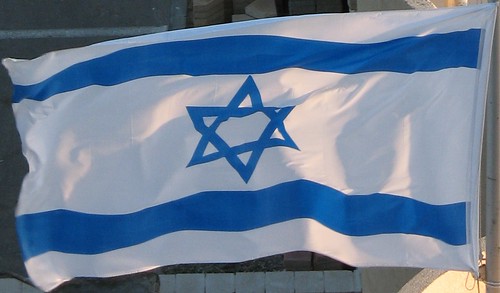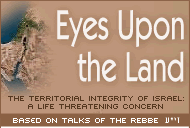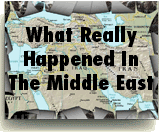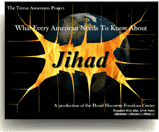Reform Judaism Mag - Winter 2007
I’m a Jew Just Like You
by Joelle Asaro Berman

Discussing Outreach
Give us adult children of intermarriage a stake in the incredibly rich tradition that is our Jewish future.
When it comes to labeling, Jews take the cake. We’ve invented a term for nearly every Jewish lifestyle. While I knew from an early age that I bore the “Reform” label, I wouldn’t learn of my “interfaith” label until I was an adult working full-time in the Jewish communal world.
As a child, nothing struck me as strange about having a non-Jewish parent. It was the norm; many of my friends came from mixed households. That’s what happens in the condensed suburbs of New Jersey: People from different backgrounds inevitably cross paths and, in some cases, decide to raise families together.
In my case the cross-pollination occurred between a Sicilian mother, raised Catholic in Lodi; and a mélange-of-Eastern-European-descent father, raised Jewish in Fair Lawn. They met at the nearby college where they both held teaching positions.
During her own college years, my mother’s devotion to Catholicism dissipated, despite an unwavering faith in God. Her biggest obstacle to raising her future children in a particular faith was not the religion itself, but her distrust of all organized religion. Conveniently, my father’s twin brother is a rabbi, and for an entire year he and my father worked to dispel her fear, answering her searching questions until she felt comfortable enough to raise us as Jews. Soon enough she was hosting my baby-naming ceremony and driving my brother David and me to Hebrew school.
And so I grew up—becoming a bat mitzvah at a Reform synagogue, discovering my Jewish identity at Reform overnight camp, and spending many fun weekends at Reform youth group events. Never was I labeled as an “interfaith kid”; having a non-Jewish mother was merely a genealogical footnote.
Imagine my surprise, then, when I started working in the larger Jewish communal world and was almost instantly labeled and made to feel inferior for having a non-Jewish mother. According to some of these Jews, my father was among those “finishing Hitler’s work” by marrying outside the faith and pushing the Jewish people closer to extinction. Entire organizations and large sums of money were being devoted to studying the impact families like mine were having on Jewish continuity. The message was clear: Despite our Jewish upbringing, patrilineal children like me needed to suck it up and convert if we wanted to be considered legitimate outside the Reform world.
These detractors remain oblivious to how an interfaith family with both parents committed to raising Jewish children works. My parents figured it out early in their marriage. They concocted a careful, deliberate recipe sure to yield children with strong Jewish identities: A heaping serving of holiday observances sweetened by the recitation of blessings every Friday night at Shabbat dinner, a good measure of Hebrew school, bar/bat mitzvah, and a generous pinch of participation in informal Jewish activities—especially URJ Joseph Eisner Camp in Great Barrington, MA, where I made lifelong friendships.
Nowadays, the Jewish elements of my identity are as deeply ingrained as the Sicilian identity which my mother worked to infuse throughout my childhood. At our third-grade “Around the World Food Fair,” I wore my great-grandmother’s dress from Sicily and my mother helped me serve homemade ravioli. David and I couldn’t just watch The Godfather—afterward, my mother would expound on the history of the Sicilian mob, which formed, we learned, as a result of the persecution and hardship Sicilian immigrants faced when they arrived in this country. I also followed my mother’s example in scoffing at waitresses who would say “ca-la-mar-i” instead of the dialectally correct “co-la-mad.”
Still, I was a Jew, even as we ate a special meal with my mother’s side of the family every year during the Feast of St. Joseph. I was a Jew, even as I hung ornaments from the Christmas tree in our living room. I was a Jew, a proud Jew at that, when both sides of my family—grandparents, aunts, uncles, and cousins—stood at my side as I ceremonially signed my bat mitzvah certificate at Barnert Temple in Franklin Lakes, New Jersey.
I see now that this is ultimately my parents’ biggest success—that I know exactly who I am: An American Jew of Sicilian heritage. And so, after wrestling with the interfaith label for the past several years, I now realize it means nothing to me except that I had a somewhat unique upbringing for an American Jewish girl.
That said, as someone who’s worn the interfaith label, let me offer some observations. One: Accept the reality of interfaith families. Whether you like it or not, the next generation of Jews will count many non-Jews as their parents and many not-typically-Jewish ethnicities as part of their identity. Two: Welcome interfaith families. For every interfaith family that’s weathered the storm of feeling unwelcome and disadvantaged, there are plenty who get lost in the flood. There’s no chance for Jewish continuity unless we open the tent to them all.
And last: Count in adult children of intermarriage. Give us a stake in the incredibly rich and resilient tradition that is also our Jewish future.
{Joelle Asaro Berman, a senior editor for JVibe (the magazine for Jewish teens), helped lead the NFTY L’dor V’dor trip in 2004.}
sample writing:
Wax and Tinsel
The Spirit of Ruth
You can always tell the sincere ones from the others. "I want to be Jewish and I don't care what it takes". "If I have to convert again and again and again, I will do it." I have great sympathy for the writer of this article and feel very sorry indeed that she is a victim of a convenience founded in the Reformist movement brought on by rampant secularism and divisive self-interest. The Patrilenial descent teshuva has resulted in vast numbers, thousands of Jews estranged from the people to which they identify themselves.
{inspiring lesson from Torah.org}
Ruth the Moabitess had an unyielding desire to join the Jewish people, fulfill the Torah and take her place in the unending saga of Jewish history. No cost was too great, no burden too unbearable. As a result, she is the model of conversion to Judaism. Ruth did not seek Israel solely because she felt comfortable with the Jews, indeed, the only Jews she knew were her first husband, brother-in-law, and mother-in-law before entering eretz Yisroel. Neither did she seek Jewish company to eat lox and bagels.
What gave Ruth her strength? Why not just hang with Naomi and be an outsider/insider?
One of the wreckage's of the Reformist movement is it's creation of now significant numbers of children produced by the married outs. Halacha has determined that many of these children are not Jewish, yet in many cases, the offspring have no personal identity other than being Jewish. Some are born into families in which multi-religious events occur: Shabbos and sunday services, Xmas and a conveniently timed Chanukah, Pesach and Easter, etc. The article above serves as testimony to the weakness of Reform Judaism. The best the author can come up with can be paraphrased as 'it isn't fair to exclude us {IE. children of interfaith}'.
Consider the following quotes:
"These detractors remain oblivious to how an interfaith family with both parents committed to raising Jewish children works. My parents figured it out early in their marriage."
"Still, I was a Jew, even as we ate a special meal with my mother’s side of the family every year during the Feast of St. Joseph. I was a Jew, even as I hung ornaments from the Christmas tree in our living room. I was a Jew, a proud Jew at that, when both sides of my family—grandparents, aunts, uncles, and cousins—stood at my side as I ceremonially signed my bat mitzvah certificate at Barnert Temple in Franklin Lakes, New Jersey. "
I am not certain what it means to be a Jew at a Catholic feast and by hanging 'Jewish' ornaments on an idol tree. What I do understand is that Judaism has laws and beliefs. Jews can find guidance on every matter in their life either by reading or asking a Rabbi (Orthodox of course). I will stop short of accusing the writer's Jewish parent of religious abuse in child rearing. But, I will say that the decision to engage in a life-time relationship with a non-Jew, especially when the non-Jew is the mother is self-destructive behavior.
Rabbi Akiva Tatz class on Intermarriage from a Mystical perspective
Ms. Berman is asking for a stake in the Jewish world without being Jewish. What stops anyone, who "feels" Jewish or even G-d forbid messianics/Jews for J from using this same justification to make an argument for inclusiveness? Why should they be excluded? They "want" to be Jewish too as did the Samarians of old or the Karaites.
Rabbinic Judaism was empowered long ago to draw the lines and those same lines today obligate us as they have obligated all Jews from the beginning of time. We now slide into the general discussion of why Reformist Judaism is outside the boundaries of mainstream Judaism, ie. "Orthodox" Judaism. The rule of patrilineal descent can no more be added to the halacha than chazer can be made kosher. Sure Jews eat pig, drive on Shabbos, and some even marry out with non-Jews. But like the discussion over gay marriage and ordination, patrilineal descent requires the Jewish people to accept and give legitimacy to actions, forbidden by Jewish law simply because there are numerous violators of these laws who wish to have their own avodah zara made permissible in the eyes of the non-violators. This is a prescription for destruction. And, it is a hallmark of the liberal indoctrination for which Reformism is now associated.
Imagine my surprise, then, when I started working in the larger Jewish communal world and was almost instantly labeled and made to feel inferior for having a non-Jewish mother. According to some of these Jews, my father was among those “finishing Hitler’s work” by marrying outside the faith and pushing the Jewish people closer to extinction.
Meschita Nedarim 64b labels a childless Jewish male (not fulfilling the mitzvah of piryah ve-rivyah) as dead even while still alive.
The emotionally gut wrenching quote above is not at all an uncommon occurrence. Most married-out parents and children of those relationships were denied the basic information they needed not only to make appropriate decisions (the parents) but even to understand the implications of those decisions (the children). Reformists are led to believe their own rejection of the halachic standard will be accepted by all Jews as status quo. To challenge the status quo makes you a "divisive" or "mean-spirited" or even "hateful" person. Who would deny this poor innocent girl of her very personage and Jewish destiny? In a logical world view, one would have to conclude that if some Jews follow one fundamental law and some an entirely different and opposite law, two entities exist where there was one previously. Or, there are two equally valid sets of law. I cannot think of anything which separates Reformists from the rest of the Jewish world more than this one issue.
These real victims, (and there are plenty) are trapped in a world that tells them they are Jewish and Halacha that determines they are not Jewish. I heard a "victim" of the patrilineal descent once relate a story from his school years. A test in math was given, and word sentences were used to calculate dates (from one date to another). The question asked the students to calculate a certain number of days using "Christmas" as one of the dates of the calculation. The student (remember who is not Halachically Jewish) did not know on what date "Christmas" fell and had to ask the teacher. Clearly, some of these "victims" know nothing other than Judaism, even if their knowledge of religion is minimal.
So where to from here? I do not believe that any progress will be made on this issue until Reformism backs away from this decision and reverses it's previous ruling. At the same time, Reformist leaders must come clean, apologize to those children of 'interfaith' relationships (in particular those who are not Jewish) and open a dialogue, in good faith with the leading Orthodox rabbonim as to setting up batei dinnim specifically to deal with each case individually as to a proper conversion. While this is an uncomfortable at best arrangement, it beats "finishing Hitler's work." Ms. Berman, please consider an Orthodox conversion. You have too much potential to be written off from the Jewish people. You must, however, take the first step.





















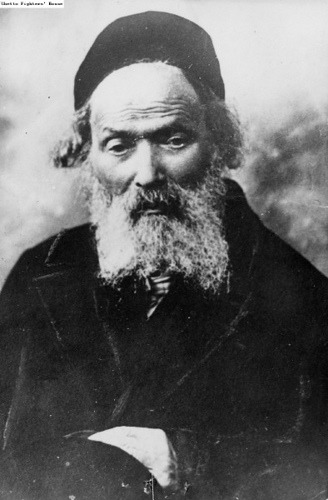









.jpg)













